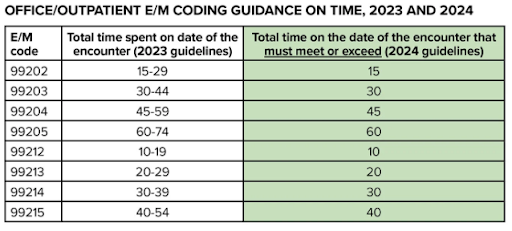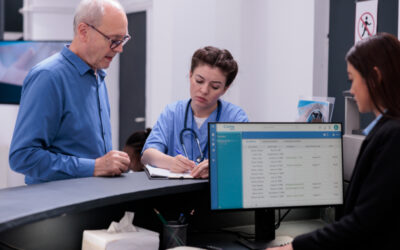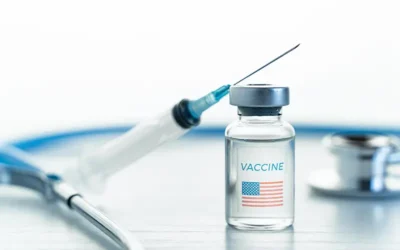Each year, the American Medical Association (AMA), Centers for Medicare and Medicaid Services (CMS), and the CPT Editorial Panel update the CPT code set a few months before its implementation. The 2024 CPT edition contains 349 changes, including 230 additions, 49 deletions, and 70 revisions, all effective January 1, 2024. As a medical coding company, we stay current with these updates to help healthcare providers submit accurate claims. Here, we’re expanding upon our previous blog about the 2024 code changes.

CPT Code Updates 2024
Evaluation and Management (E/M)
Revisions have been made to standardize the E/M sections with the aim to reduce providers’ documentation burden. Office/outpatient visit E/M time-based coding change in 2024 to align with other E/M codes. Time ranges have been removed and replaced with base time to meet or exceed. When selecting a code based on time, the provider who spent most of the time would report the service in a split/shared visit. Guidelines have also added to clarify how to report multiple E/M services on the same date.
Revisions made to E/M services include:
- Removal of time ranges from office or other outpatient visit codes (99202-99205, 99212-99215) to align with other E/M codes
- A description defining the “substantive portion” of a split/shared E/M visit, where a physician and a non-physician practitioner collaborate to provide all necessary work for the visit
- Instructions for reporting hospital inpatient or observation care services and admission and discharge services for the use of codes 99234-99236 when the patient stay crosses over two calendar dates.
The following table shows E/M coding guidance changes from 2023:
New COVID-19 Vaccine Codes
The coding guidance for COVID-19 vaccines has been revised to accommodate newly formulated shots designed to target emerging variants. These updates adhere to the recommendations from the FDA and CDC, urging vaccination for everyone aged six months and older with these new formulations. Notably, there are 5 new monovalent vaccines from Pfizer and Moderna for COVID-19, along with a universal administration code CPT code 90480.
- 90480 Immunization administration by intramuscular injection of severe acute respiratory syndrome coronavirus 2 (SARS-CoV-2) (coronavirus disease [COVID-19]) vaccine, single dose (for all ages)
- 91318 (Pfizer) Severe acute respiratory coronavirus 2 (SARS-CoV-2-) (coronavirus disease [COVID-19]) vaccine, mRNA-LNP, spike protein, 3 mcg/0.2 mL dosage, diluent reconstituted, tris-sucrose formulation, for intramuscular use
(6 months through 4 years) - 91319 (Pfizer) Severe acute respiratory coronavirus 2 (SARS-CoV-2-) (coronavirus disease [COVID-19]) vaccine, mRNA-LNP, spike protein, 10 mcg/0.2 mL dosage, diluent reconstituted, tris-sucrose formulation, for intramuscular use
(5 years through 11 years) - 91320 (Pfizer) Severe acute respiratory syndrome coronavirus 2 (SARS-CoV-2) (coronavirus disease [COVID-19]) vaccine, mRNA-LNP, spike protein, 30 mcg/0.3 mL dosage, tris-sucrose formulation, for intramuscular use
(12 years and older) - 91321 (Moderna) Severe acute respiratory syndrome coronavirus 2 (SARS-CoV-2) (coronavirus disease [COVID-19]) vaccine, mRNA-LNP, 25 mcg/0.25 mL dosage, for intramuscular use
(6 months through 11 years) - 91322 (Moderna)
Severe acute respiratory syndrome coronavirus 2 (SARS-CoV-2) (coronavirus disease [COVID-19]) vaccine, mRNA-LNP, 50 mcg/0.5 mL dosage, for intramuscular use
(12 years and older)
Respiratory Syncytial Virus (RSV) Codes
Adults 65 and over and adults with chronic conditions or weakened immune systems are at high risk for developing severe RSV. As people do not develop long-lasting immunity to the condition, they become infected repeatedly over their lifetime.
In July 2023, the U.S. Food and Drug Administration approved Beyfortus (nirsevimab-alip) for the prevention of RSV. There are new CPT) codes for the administration of nirsevimab (Beyfortus), a monoclonal antibody designed to protect infants and toddlers from severe disease caused by RSV infection.
- 90380 Respiratory syncytial virus, monoclonal antibody, seasonal dose; 0.5 mL dosage, for intramuscular use
- 90381 Respiratory syncytial virus, monoclonal antibody, seasonal dose; 1 mL dosage, for intramuscular use

Important:
When reporting any of the vaccine products:
- Include an appropriate vaccine administration code, such as 90471 (Immunization administration (includes percutaneous, intradermal, subcutaneous, or intramuscular injections); 1 vaccine (single or combination vaccine/toxoid)).
- Follow state and managed care organization immunization reporting guidelines when the product is supplied through the Vaccines for Children program. Based on state regulations, append the SL modifier to indicate it is a state-supplied product.
CPT codes 90678-90679 are for vaccines recommended for people ages 60 years and older.
- 90678 (Respiratory syncytial virus vaccine, preF, subunit, bivalent, for intramuscular use) 90679 (Respiratory syncytial virus vaccine, preF, recombinant, subunit, adjuvanted, for intramuscular use) became effective in May of 2023.
- 90683 – Effective Jan. 1, 2024, code 90683 (Respiratory syncytial virus vaccine, mRNA lipid nanoparticles, for intramuscular use) is also available.
Musculoskeletal System
There are three new codes for anterior thoracic vertebral body tethering, a procedure performed on patients with scoliosis:
- 22836 for anterior thoracic vertebral body tethering when performed for up to seven vertebral segments.
- 22837 for anterior thoracic vertebral body tethering when performed for eight or more vertebral segments.
- 22838 for the revision, replacement, or removal of the thoracic vertebral body tethering.
There is a new code for sacroiliac joint arthrodesis:
- 27278 for percutaneous placement of an intra-articular stabilization device into the sacroiliac joint using a minimally invasive technique that does not transfix the sacroiliac joint
Codes (28292-28299) for correction of the hallux valgus family have been updated to remove the term “bunionectomy” from parentheses and specify the procedure as “with bunionectomy.
New Surgery Codes
Cardiovascular System
- 33276- 33288 – 8 new codes for the phrenic nerve stimulation system.
Urinary System
- 52284 – Cystourethroscopy, with mechanical urethral dilation and urethral therapeutic drug delivery by drug coated balloon catheter for urethral stricture or stenosis, male, including fluoroscopy, when performed)
Female Genital System
- 58580 for Transcervical radiofrequency ablation of uterine fibroid(s). The procedure includes intraoperative ultrasound guidance and monitoring.
Nervous System
- Three new codes for skull-mounted cranial pulse generator or receiver procedures: 61889 for insertion; 61891 for revision or replacement, and 61892 for the removal.
- Revised: 4 nervous system surgery codes 63685 63688, 64590, and 64595 have been revised:
Radiology
New codes:
75580 for reporting a noninvasive estimate of coronary fractional flow reserve (FFR) derived from augmentative software analysis of the data set from a coronary computed tomography angiography
76984 to describe diagnostic intraoperative thoracic aorta ultrasound
76987, 76988,and 76989: 3 new codes for epicardial ultrasound for congenital heart disease:
Deleted: Pelvimetry code 74710 has been deleted.
In addition to the above, there are code updates in the Medicine and Pathology and Laboratory sections.
Consumer-friendly Codes
In 2024, the AMA has taken a big step towards promoting transparency for non-English speaking populations with the introduction of Spanish Consumer Friendly Terms (CFTs) on over 11,000 codes. AMA Senior Vice President of Health Solutions Lori Prestesater, noted: “Providing approximately 41 million Spanish speaking individuals in the United States with an easy-to-understand description of medical procedures and services can help build a more inclusive health care environment, where language is no longer a barrier and patients can actively engage in their own care.”


Save time, money, and resources with our medical billing and coding expertise!





